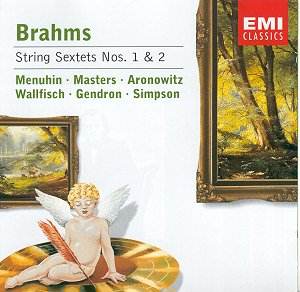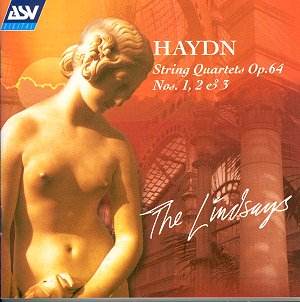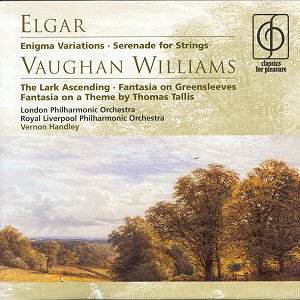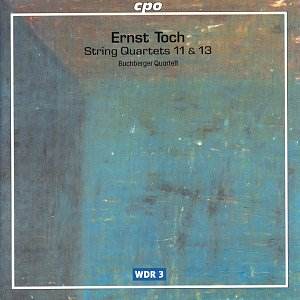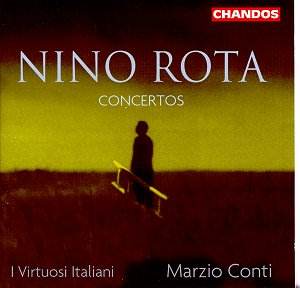 Composer: Nino Rota
Composer: Nino Rota
Works: Concerto for Harp, Concerto for Bassoon, Castel del Monte, Concerto for Trombone
Performers: Luisa Prandina (harp), Paolo Carlini (bassoon), Guido Corti (horn), Andrea Conti (trombone), I Virtuosi Italiani, Marzio Conti (conductor)
Recording: Auditorium Panduera, Cento, Italy, November 2000
Label: CHANDOS
Nino Rota’s reputation as a composer often oscillates between the realms of film and concert music, a duality that perhaps undermines the perceived gravity of his concert repertoire. Rota, who famously scored numerous films for Federico Fellini and others, infused his concert works with the same lyrical charm and buoyancy that characterized his cinematic scores. This new release from Chandos presents an appealing collection of Rota’s concertos, including three works that have long awaited their debut on disc, offering a refreshing opportunity to reassess his contributions to the orchestral landscape.
The Concerto for Harp opens the disc with a delicate touch that, while undeniably pretty, reveals the inherent challenges of balancing the harp’s quiet sonority against the orchestral backdrop. Rota’s harmonic language here leans towards the pastoral, evoking imagery akin to a gentle breeze rather than a tempest. Despite the skillful playing of Luisa Prandina, who brings an ethereal quality to the solo lines, the concerto feels somewhat underwhelming. The orchestration lacks the necessary weight to fully complement the harp, leading to a performance that, while lovely, tends to drift into the background rather than command attention.
Paolo Carlini takes center stage in the Concerto for Bassoon, a piece that, while not breaking new ground in terms of its idiomatic treatment of the instrument, showcases Rota’s ability to craft engaging melodies and characterful episodes. Carlini’s interpretation is buoyant, capturing the whimsical essence of the work with a tone reminiscent of the late Klauss Thünemann. The opening toccata is imbued with a sense of earnestness, while the introspective recitative provides a refreshing contrast. The variations in the finale, particularly the Sicilienne, reveal Rota’s knack for drawing on familiar idioms, though one cannot help but note the echoes of Faure’s music. Carlini navigates these shifts with finesse, making this performance a highlight of the recording, deserving of a place in the bassoon repertoire.
Castel del Monte, originally composed for horn and orchestra, is a notable departure from the lighter textures of the previous works. With its rich, atmospheric orchestration, it resonates with the lushness found in the works of Chausson. The members of I Virtuosi Italiani approach this piece with a heightened sense of drama, particularly in their nuanced dynamics and phrasing, which elevate the overall impact. Guido Corti’s horn playing, characterized by its warmth and lyricism, brings a poignant depth to the score, showcasing Rota’s ability to evoke a more substantial musical narrative.
The disc concludes with the Concerto for Trombone, a work that, unlike the harp concerto, benefits from Rota’s exuberant orchestration. Andrea Conti tackles the piece with aplomb, delivering the rumbustious lines with a brassy flair that plays to the strengths of the trombone. The work’s playful spirit is infectious, and Conti’s technical prowess allows for a jubilant interpretation that leaves a lasting impression.
Chandos has once again excelled in sound quality and engineering, capturing the rich textures of Rota’s orchestration with clarity and depth. Each instrument is well-balanced within the ensemble, allowing for a nuanced listening experience that reveals the subtleties of Rota’s orchestrational choices.
Rota’s concertos, while perhaps not groundbreaking in the broader context of classical music, offer a delightful blend of charm and accessibility. The performances here are commendable, showcasing the skills of both soloists and orchestra in a repertoire that deserves greater recognition. This recording is a testament to Rota’s enduring legacy, appealing to both aficionados of 20th-century music and newcomers alike. The virtues of simplicity and good humor make this collection a pleasant diversion, affirming Rota’s place in the pantheon of celebrated composers beyond his cinematic exploits.
